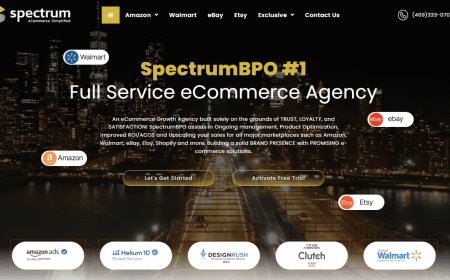What Features Should You Look for in an AI-Powered Search Solution?
Discover the key features to consider when choosing an AI-powered search solution to enhance accuracy, relevance, and user experience.

In the modern digital landscape, data is being generated at an unprecedented rate. From customer inquiries and product catalogs to support tickets and enterprise documents, businesses are swimming in information. The ability to find the right piece of data at the right moment is not just a convenienceit's a competitive advantage. That's where AI-powered search solutions come into play.
Unlike traditional keyword-based search engines that rely on exact term matches, AI-powered search leverages artificial intelligence, machine learning, and natural language processing to understand the context, intent, and nuances of user queries. These intelligent systems can deliver faster, more accurate, and more relevant search results, dramatically improving user experience and business outcomes.
However, not all AI search platforms are created equal. When evaluating your options, its crucial to understand the key features that set a great solution apart from a good one. In this blog, well explore the essential features you should look for in an AI-powered search solution to ensure it meets your organization's needs.
1.Natural Language Understanding (NLU)
The cornerstone of any effective AI search system is its ability to understand human language the way people naturally speak or write. Natural Language Understanding (NLU) enables the search tool to go beyond mere keywords and interpret the actual intent behind a query.
For instance, a query like Whats the best laptop under $1000 for video editing? is complex. A good AI search solution should recognize this query's sentiment, context, and goal, returning options optimized for both price and video editingnot just laptops that contain the word best.
Why it matters: NLU enhances user satisfaction by delivering results that are highly relevant to the searchers actual needs, not just their words.
2.Semantic Search Capabilities
Semantic search leverages AI to understand the meaning and relationships between words. Unlike traditional search methods, which may rely on matching literal words, semantic search processes concepts and synonyms. For example, if someone searches for "heart attack," the system should also consider documents that mention "myocardial infarction."
Key capabilities to look for:
-
Synonym detection
-
Concept clustering
-
Query rewriting
-
Entity recognition
Why it matters: This feature reduces the chance of no results found and surfaces more valuable information that keyword searches might miss.
3.Personalization and Context Awareness
A truly intelligent search solution should adapt to users over time. Personalization involves tailoring search results based on user preferences, behavior, location, or job role. Context awareness ensures that the search engine recognizes the environment and situation in which a query is made.
For example, if a returning customer frequently searches for content related to marketing automation, the AI should prioritize marketing-related content in future search results. Similarly, an internal search engine should prioritize documents relevant to an employee's department.
Why it matters: Personalized experiences increase engagement, reduce search time, and improve satisfaction.
4.Multilingual Support
In a global business environment, users may speak different languages or prefer searching in their native tongue. AI-powered search solutions with multilingual support can interpret and return results across various languages, even translating them where necessary.
Advanced platforms also use cross-lingual search, where a query in one language can retrieve relevant documents in another.
Why it matters: This expands accessibility and inclusivity, especially for multinational companies and diverse customer bases.
5.Robust Ranking Algorithms
Not all search results are created equal. Ranking algorithms determine the order in which results appear based on relevance, recency, popularity, or business priorities.
AI-enhanced ranking models go a step further by learning from user interactions (clicks, bounce rate, dwell time) to continuously refine the results.
Features to consider:
-
Machine learning-driven ranking
-
Feedback loops
-
Business rules (to prioritize certain content)
Why it matters: Well-ranked results ensure users see the most helpful content first, which improves usability and conversion rates.
6.Faceted and Filtered Search Options
AI doesnt replace filtersit enhances them. Faceted search allows users to narrow down results using structured metadata like date, category, price range, or author. AI can automatically suggest the most relevant filters based on the query or user profile.
Some advanced solutions dynamically generate filters based on content analysis, even if structured metadata is missing.
Why it matters: Filters reduce cognitive load and help users zero in on what they need faster.
7.Intelligent Autocomplete and Query Suggestions
Autocomplete features that suggest queries as users type can dramatically reduce search time and errors. With AI, these suggestions are not just based on popular queries, but also on user history, trending topics, and semantic context.
Smart systems may also suggest related questions (FAQ-style), helping users explore relevant content paths.
Why it matters: This feature drives engagement, reduces friction, and educates users on how to search better.
8.Advanced Analytics and Reporting
Search insights can reveal much about user behavior, content gaps, and system performance. An AI-powered search solution should include a robust analytics dashboard with metrics like:
-
Top queries
-
Failed searches (zero-result queries)
-
Click-through rates
-
Time to result
Some systems also use AI to detect anomalies or trends in search behavior, enabling proactive improvements.
Why it matters: Continuous monitoring and optimization are key to maintaining high performance and ROI.
9.Scalability and Integration
The solution should be scalable to support growing data volumes, users, and types of content (structured and unstructured). Equally important is its ability to integrate seamlessly with your existing tech stack, such as:
-
Content management systems (CMS)
-
Customer relationship management (CRM)
-
Document repositories
-
Helpdesks and support platforms
APIs, SDKs, and pre-built connectors are essential for easy integration.
Why it matters: A scalable and interoperable system ensures long-term viability and reduces IT friction.
10.Security and Data Privacy Compliance
AI search platforms must protect sensitive data and comply with regulations such as GDPR, HIPAA, or CCPA. Features to consider include:
-
Role-based access controls
-
Data encryption
-
Audit logs
-
Anonymization options
Some platforms also offer on-premise deployment or private cloud hosting for more stringent security requirements.
Why it matters: Trust is non-negotiable when dealing with proprietary or personal data.
11.Custom Training and Domain-Specific Models
Out-of-the-box AI models can do a lot, but industry-specific vocabulary (e.g., medical, legal, financial) often requires customization. Look for platforms that allow:
-
Custom entity recognition
-
User-defined taxonomies
-
Model training with your data
Why it matters: Customization ensures better relevance in niche or specialized environments.
12.Conversational and Voice Search
As voice-enabled devices and chatbots gain popularity, your search solution should support conversational interactions. Natural language interfaces (chat or voice) enable users to "talk" to the search engine like a virtual assistant.
These systems must understand back-and-forth dialogue, follow-up questions, and corrections naturally.
Why it matters: It creates a modern, user-friendly experience and is especially useful for mobile or hands-free environments.
Conclusion
AI has redefined what users expect from search. From understanding intent and context to delivering personalized, real-time insights, todays AI-powered tools are far more than simple information retrieversthey are intelligent digital assistants.
When selecting an AI-Powered Search Solution, its essential to look beyond marketing hype and evaluate features like natural language understanding, semantic search, intelligent ranking, and robust analytics. Only then can you ensure the solution not only meets current demands but also evolves with your business over time.
With the right features in place, an AI-powered search solution can become one of your most strategic toolsempowering employees, delighting customers, and unlocking the full value of your organizations information.











































